AO3 Tagging Inspiration.

AO3 Tagging Inspiration.
Mainly a reference for me bc I always blank when it comes to tags. Sharing in case it helps anyone else, but not intended to be prescriptive. Further references:
Ao3’s Rating System Explanation
Difference Between "A/B" and "A&B"
Fanwork Ao3 Accepts Beyond Fanfic
How tagging a pairing in the “Relationship” field vs in “Additional Tags” changes search results
List of Writing Genres
Trope Examples
Most Popular Tags on Ao3
My humble plea for people to cross-post their meta & other fannish nonfiction to ao3, and tag it with “meta analysis” so I can find it and adore it
More Posts from Wierduff and Others
Sites to Help with Writing
1 - [ https://www.yourdictionary.com ] I use this site for the thesaurus, It helps to find synonyms for words so you don't repeat "said" a thousand times in your book.
2 - [ https://milanote.com ] This one is very helpful for organising your ideas with story boards, though it's partially free it has a paid version where you can get even more features. I use the free version.
3 - [ https://inkarnate.com ] This site is very popular to create maps, and for good reason. It's free version gives you all the features necessary to create maps, but the paid version gives you extra features. I use the free version.
4 - [ https://www.behindthename.com ] I use this one for names. It has a database of endless names alongside their country of origin and meaning. Very useful, though I use it to make sure the names I come up with don't end the wrong way.
5 - [ https://www.pinterest.com ] Do I even need to explain? Ideas? Here. Visualisation? Here. Everything you'll ever need? Here.
6 - [ https://quillbot.com ] Heard of it from a beloved friend. This site is useful for tone checks, grammar checks, and more. I only use it to edit.
7 - [ Google Docs ] I only use this one for writing, its free and perfectly usable.
8 - [ https://www.artbreeder.com ] This one is essential for character creation. It has many features that allows you to visualise and create portraits for your characters.
Bonus:
I use [ https://tabletopaudio.com ] for background noise while writing, because i cant focus in silence.
That's all, I hope this proves useful :)
Studio Ghibli’s animation software will be made available via open source this month.
That’s right…💯% free.
Read more on CartoonBrew.com


refseek.com

www.worldcat.org/

link.springer.com

http://bioline.org.br/

repec.org

science.gov

pdfdrive.com
friendly reminder that findtags is the best way to search tumblr’s absolutely destroyed tag system. it actually accurately looks through the tags without omitting results. it’s the only thing i use at this point because it’s the only thing that works
Things almost every author needs to research
How bodies decompose
Wilderness survival skills
Mob mentality
Other cultures
What it takes for a human to die in a given situation
Common tropes in your genre
Average weather for your setting


refseek.com

www.worldcat.org/

link.springer.com

http://bioline.org.br/

repec.org

science.gov

pdfdrive.com
Let's talk about foreshadowing.
Foreshadowing can add a lot of depth to your writing and make it more exciting for the readers. They create a sense of coherence and satisfaction when future events unfold as hinted—or shock if they don't.
Here are some tips for effectively using foreshadowing in your novels and books:
Plan Ahead: Foreshadowing works best when it's woven into the fabric of your story from the beginning. As you outline your plot, think about key events and revelations you want to foreshadow, and strategically place hints and clues accordingly.
Use Subtlety: Foreshadowing doesn't have to be obvious or heavy-handed. The best foreshadowing is often subtle and understated, leaving readers with a sense of intrigue and curiosity rather than outright prediction.
Establish Patterns and Motifs: Look for opportunities to establish recurring patterns, motifs, or symbols that can subtly hint at future events. These can be visual, thematic, or even linguistic cues that tie into the larger narrative arc of your story.
Create Tension: Foreshadowing is most effective when it creates tension and anticipation for the reader. Use foreshadowing to hint at potential conflicts, obstacles, or twists.
Reveal Gradually: Foreshadowing doesn't have to be limited to one-off hints or clues. Instead, consider how you can layer foreshadowing throughout your story, gradually revealing more information as the plot unfolds.
Pay Attention to Timing: The timing of your foreshadowing is crucial. Introduce hints and clues at strategic points in your story, building anticipation and suspense without giving too much away too soon.
Revisit Foreshadowing: Ensure that foreshadowed events are eventually fulfilled or addressed in the story. Revisiting earlier hints or clues can provide a satisfying payoff for readers and reinforce the narrative coherence.
Balance Subtlety and Clarity: Foreshadowing should be subtle enough to intrigue readers without giving away major plot twists too early. Aim for a balance where foreshadowing is noticeable upon reflection but doesn't detract from the immediacy of the story.
Let's look at some ways to incorporate foreshadowing:
Symbolism: Symbolic imagery or motifs can serve as subtle foreshadowing devices. Think about objects, settings, or descriptive details that can serve as symbolic foreshadowing. A recurring image or object, for example, might subtly hint at future events or themes in the story.
Dialogue Clues: Characters can drop hints or make cryptic remarks that foreshadow upcoming events. Dialogue is a natural way to introduce foreshadowing without being too obvious.
Character Reactions: Pay attention to how characters react to certain situations or events. Their emotions or responses can foreshadow future conflicts or revelations.
Subtle Descriptions: Incorporate subtle descriptions or details that hint at future events. These can be easily overlooked on a first read but become significant upon reflection or when the foreshadowed event occurs.
Dreams and Visions: Dreams, visions, and other forms of altered consciousness can be effective vehicles for foreshadowing—they can hint at an upcoming event, or explore characters' subconscious desires and fears. This method can sometimes be either blatant or subtle depending on how it is incorporated.
Foreshadowing Through Setting: Use the setting to foreshadow events or developments in the story. For example, a stormy night might foreshadow conflict or turmoil ahead, while a serene setting might signal upcoming peace or resolution. (On the flip side, this can be used to catch readers off guard, like a "calm before the storm" type of situation.)
Parallel Storylines: Foreshadowing can occur through parallel storylines or subplots. Events in one storyline can subtly hint at future developments in another, creating anticipation and intrigue.
Recurring Themes: Identify recurring themes or motifs in your story and use them to foreshadow future events. These thematic elements can serve as subtle hints or clues for attentive readers.
Misdirection: Foreshadowing can be used to misdirect readers and create suspense by hinting at one outcome while actually leading to another. (See my post on misdirection for more!)
Happy writing! ❤
a whole bunch of links for a bad day
serotonin
2048
control the weather (flash warning)
spend bill gates’ money
read a book
write without distractions
snickerdoodle mug cakes
recipes for when you’re low on spoons
khan academy
an aggressive reminder
1000 awesome everyday things
make a picrew of a worm on a string
bongo cat
useless websites
emergency compliments
a nice uquiz
more useless websites
sketch comedy
sculpt something
guess google searches
white noise
rain
customizable
coffee shop
thunderstorm + fireplace
rain on a tin roof
rain + traffic
train sounds
a fan
catharsis
scream into the void
cut your screen (trigger warning)
break glass
self-care
inexpensive self-care
small acts of self-care
develop a self-care plan
do nothing for two minutes
cope with:
common sleep problems (+solutions)
nightmares
stress
stress 2
are you stressed or depressed?
homework stress
an eating disorder
things to do instead of harming yourself
trauma
anger
worrying
grief
a breakup
the suicide of a loved one
bullying
is this relationship harmful?
sexual assault
obsessive-compulsive disorder
obsessive-compulsive disorder 2
suicidal thoughts
help
a whole bunch of hotlines
more hotlines
suicide hotlines
talk to someone
active positivity blogs
@positivityreblogs
@positivitie
@recoverystuff
@survivor-positivity
@ocdiscourse
@positivelypastelpink
@positiveautistic
@mental–healthawareness
@slfcare
@traumasurvivors
@softheartedsuggestion
remember:
drink some water
eat something if you haven’t in a while
take a break
sleep if you need to
you’re doing amazing i love you
TRANS WOMEN: HERE'S SOME SHIT YOUR DOCTOR WONT TELL YOU ABOUT HRT
1. Progesterone: not for everyone, but for many people it may increase sex drive and WILL make your boobs bigger. Also effects mood in ways that many find positive (but some find negative). Most doctors won’t prescribe this to you unless you ask. Most trans girls I know swear by it.
2. Injectible estrogen: is more effective than pill or patch form. Get on it if you can bear needles bc you will see more effects more quickly.
3. Estradiol Cypionate: There is currently a shortage of injectible estradiol valerate. There is no shortage of estradiol cypionate. Functionally they do the same shit.
4. Bicalutamide: This is an anti-androgen that has almost none of the side-effects of spironolactone or finasteride. The girls I know who are on it are evangelical about it.
Facts about in-game Yuu (Twisted Wonderland):
NOTES:
This is an ongoing the list and will be updated when there's new information. I'm not caught up w/ chap 6 and I'm not very perceptive. This list will probably be a lot longer if anyone could add to it in the comments, tags & reblogs! All help is very much appreciated plz i wanna know more about yuu Last but not least, some of these might be a stretch/be slightly incorrect so bare w/ me plz :]
They've been good friends with Heartslabyul ever since Book 1.
They're forgiving/don't hold any bad blood with the people who've overblotted (at least on the outside).
According to the Harveston event, they can play the flute.
They don't like bringing up the fact that they might go back to their world (Deuce's Wishing Star vignette).
Many people seem to consider them a "goody-two shoes" (Leona, Ruggie).
A good listener.
Based off of Malleus' interactions with them, Yuu talks to him a lot more off-screen as Malleus states that he values their opinions.
Loves Grim to hell and back.
It's implied that Yuu invites Malleus over frequently enough that he visits unprompted.
They can be snarky and brutally honest when they're pushed into it.
Comes up with stupid plans that nobody believes will work but it somehow does.
They're insecure about not having any magic.
They want to be able to help their friends.
Has a sense of self-preservation.
Does not actively seek out danger (*cough* om mc *cough*).
They've cleaned up Ramshackle since living there, however, it still looks "abandoned & ancient" on the outside.
Crowley doesn't give them more money than "needed".



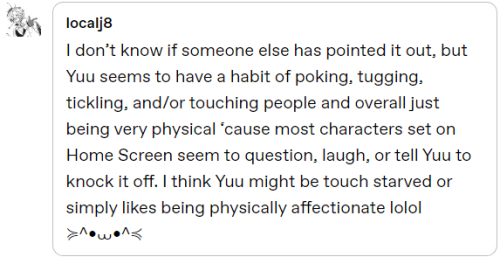
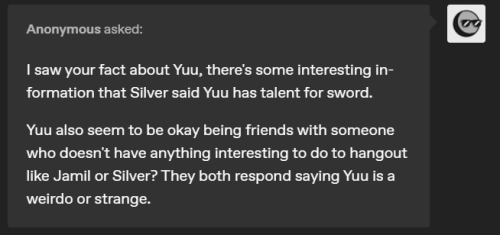
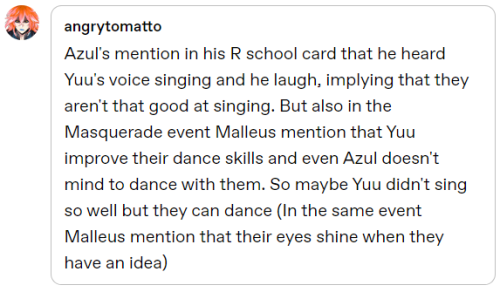
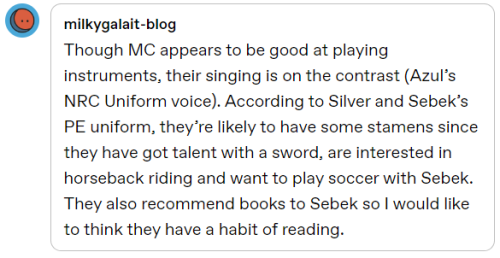
*if i'm not mistaken, i think stamens is meant to be stamina? @milkygalait-blog plz correct me if im wrong :]
They don't know much about mushrooms (Floyd's Camp Vargas vignette).

They're very patient.
Used to be afraid of ghosts until they got to Twisted Wonderland.
They adapt to new/difficult situations quickly and calmly.
They don't complain much.
Very much so the silent type.
The audience doesn't really see anyone helping them out with their situation, so I assume they fix most of their problems themselves.
They don't have any memories of the Great Seven prior to coming to Twisted Wonderland.
Fluctuates between being observant and not noticing really basic stuff.
Doesn't hesitate to say cheesy things.
Keeps calm in harsh situations.

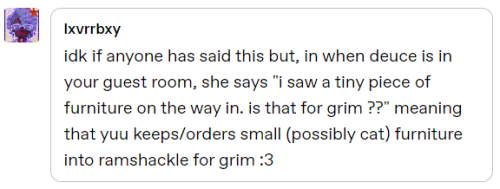

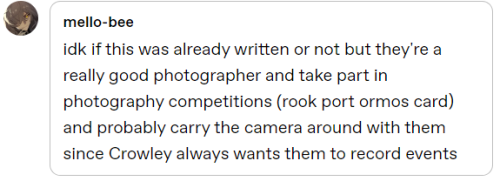

Here is @darkscorpiox list on other Yuu facts.
Here is @starsilluminateourgalaxy list on other Yuu facts.
-
 smol-rabbit-ghost reblogged this · 2 weeks ago
smol-rabbit-ghost reblogged this · 2 weeks ago -
 smol-rabbit-ghost liked this · 2 weeks ago
smol-rabbit-ghost liked this · 2 weeks ago -
 isolasea liked this · 2 weeks ago
isolasea liked this · 2 weeks ago -
 her-gracious-lady-herald-bits1 liked this · 2 weeks ago
her-gracious-lady-herald-bits1 liked this · 2 weeks ago -
 russkayas reblogged this · 2 weeks ago
russkayas reblogged this · 2 weeks ago -
 russkayas liked this · 2 weeks ago
russkayas liked this · 2 weeks ago -
 the-chaos-goblin reblogged this · 2 weeks ago
the-chaos-goblin reblogged this · 2 weeks ago -
 the-chaos-goblin liked this · 2 weeks ago
the-chaos-goblin liked this · 2 weeks ago -
 sweetheart-haely liked this · 2 weeks ago
sweetheart-haely liked this · 2 weeks ago -
 newreblogontheblock reblogged this · 2 weeks ago
newreblogontheblock reblogged this · 2 weeks ago -
 newhermitblogontheblock liked this · 2 weeks ago
newhermitblogontheblock liked this · 2 weeks ago -
 emmabirb8 liked this · 2 weeks ago
emmabirb8 liked this · 2 weeks ago -
 not-sure-what-im-feeling liked this · 2 weeks ago
not-sure-what-im-feeling liked this · 2 weeks ago -
 mrfluffles300 liked this · 2 weeks ago
mrfluffles300 liked this · 2 weeks ago -
 mrfluffles300 reblogged this · 2 weeks ago
mrfluffles300 reblogged this · 2 weeks ago -
 chronically-vampiric reblogged this · 2 weeks ago
chronically-vampiric reblogged this · 2 weeks ago -
 sweetly-shining liked this · 2 weeks ago
sweetly-shining liked this · 2 weeks ago -
 leota-nexus liked this · 2 weeks ago
leota-nexus liked this · 2 weeks ago -
 blupeeblep reblogged this · 2 weeks ago
blupeeblep reblogged this · 2 weeks ago -
 blupeeblep liked this · 2 weeks ago
blupeeblep liked this · 2 weeks ago -
 queer-here-and-in-fear reblogged this · 2 weeks ago
queer-here-and-in-fear reblogged this · 2 weeks ago -
 queer-here-and-in-fear liked this · 2 weeks ago
queer-here-and-in-fear liked this · 2 weeks ago -
 glacierruler reblogged this · 2 weeks ago
glacierruler reblogged this · 2 weeks ago -
 oatmealdaydreams reblogged this · 2 weeks ago
oatmealdaydreams reblogged this · 2 weeks ago -
 hauntedshrimp liked this · 2 weeks ago
hauntedshrimp liked this · 2 weeks ago -
 accessibleacademia reblogged this · 2 weeks ago
accessibleacademia reblogged this · 2 weeks ago -
 notalotgoingonatthisinstant reblogged this · 2 weeks ago
notalotgoingonatthisinstant reblogged this · 2 weeks ago -
 starsproouts liked this · 2 weeks ago
starsproouts liked this · 2 weeks ago -
 leftcheesecakephilosopher liked this · 3 weeks ago
leftcheesecakephilosopher liked this · 3 weeks ago -
 impossibleknots liked this · 3 weeks ago
impossibleknots liked this · 3 weeks ago -
 raincitygirl76 reblogged this · 3 weeks ago
raincitygirl76 reblogged this · 3 weeks ago -
 star-my reblogged this · 3 weeks ago
star-my reblogged this · 3 weeks ago -
 star-my liked this · 3 weeks ago
star-my liked this · 3 weeks ago -
 janemoreau liked this · 3 weeks ago
janemoreau liked this · 3 weeks ago -
 j-a-nuary liked this · 3 weeks ago
j-a-nuary liked this · 3 weeks ago -
 panickedgriddle liked this · 3 weeks ago
panickedgriddle liked this · 3 weeks ago -
 kiestrokes reblogged this · 3 weeks ago
kiestrokes reblogged this · 3 weeks ago -
 masteracewindu liked this · 4 weeks ago
masteracewindu liked this · 4 weeks ago -
 yumichiibi liked this · 4 weeks ago
yumichiibi liked this · 4 weeks ago -
 afteriwake reblogged this · 1 month ago
afteriwake reblogged this · 1 month ago -
 empresstempestra reblogged this · 1 month ago
empresstempestra reblogged this · 1 month ago -
 raincitygirl76 liked this · 1 month ago
raincitygirl76 liked this · 1 month ago -
 kawaii-bear254 reblogged this · 1 month ago
kawaii-bear254 reblogged this · 1 month ago -
 kerim-08 reblogged this · 1 month ago
kerim-08 reblogged this · 1 month ago -
 jackalopc liked this · 1 month ago
jackalopc liked this · 1 month ago -
 jackalopc reblogged this · 1 month ago
jackalopc reblogged this · 1 month ago -
 wendydellapioggia reblogged this · 1 month ago
wendydellapioggia reblogged this · 1 month ago -
 mandostailor liked this · 1 month ago
mandostailor liked this · 1 month ago

